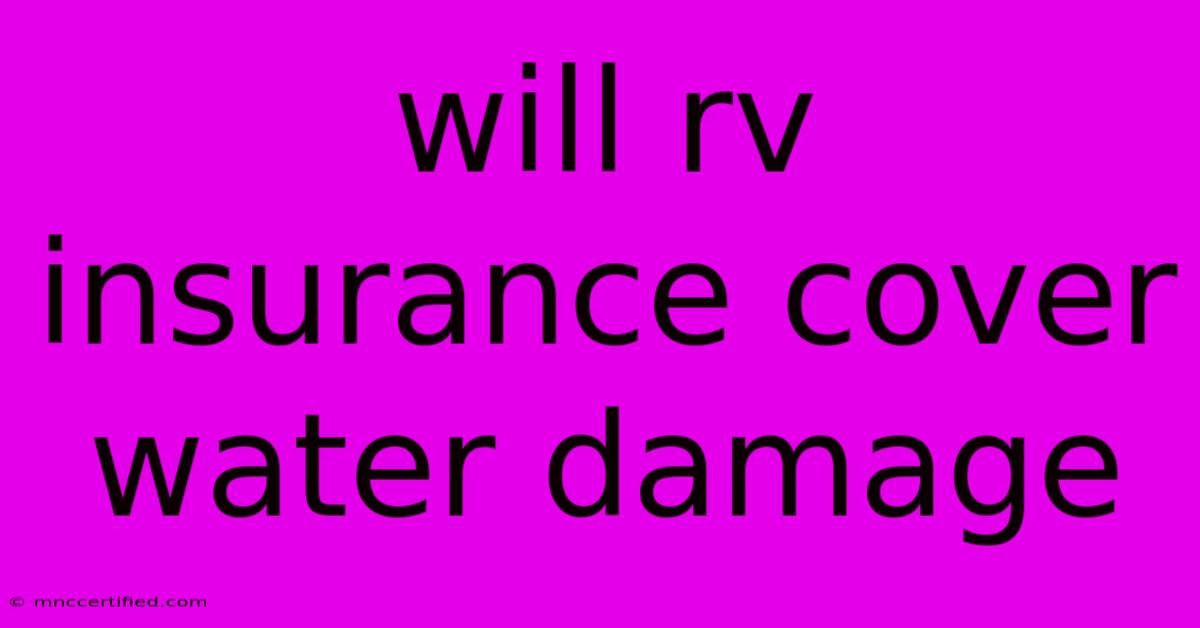Will Rv Insurance Cover Water Damage

Table of Contents
Will RV Insurance Cover Water Damage?
The answer to the question, "Will RV insurance cover water damage?" is not a simple yes or no. While RV insurance policies often include coverage for water damage, the specifics of your policy will determine what is covered and to what extent.
Understanding Water Damage in RVs
Water damage can occur in RVs in various ways, including:
- Leaks: From the roof, windows, plumbing, or appliances.
- Flooding: Due to heavy rain, a burst pipe, or a sewage backup.
- Condensation: Caused by humidity build-up inside the RV.
It's essential to remember: Not all water damage is created equal, and the circumstances surrounding the damage can significantly impact whether your insurance covers it.
What Does RV Insurance Typically Cover?
Most RV insurance policies will cover water damage that is caused by:
- Sudden and accidental events: Like a burst pipe or a storm that causes flooding.
- Covered perils: Such as hail, fire, or theft.
However, policies often exclude coverage for:
- Neglect or lack of maintenance: Like failing to address a slow leak or properly maintain plumbing.
- Pre-existing conditions: If you were aware of a leak before the damage occurred and didn't take action, your claim might be denied.
- Wear and tear: General wear and tear on the RV, like deterioration due to age or normal use, is not typically covered.
Checking Your Policy Carefully
To be certain of what your specific RV insurance policy covers, it's vital to:
- Read your policy carefully: Pay close attention to the sections on water damage, exclusions, and limitations.
- Speak to your insurance agent: Ask them to clarify any points that are unclear or ambiguous.
Tips for Preventing Water Damage
The best way to protect your RV from water damage is to take proactive measures:
- Regular maintenance: Inspect your roof, plumbing, and appliances regularly for any signs of leaks.
- Keep it clean and dry: Avoid leaving standing water in the RV, and ensure it has proper ventilation to prevent condensation.
- Store it properly: During periods of non-use, store your RV in a covered area to protect it from the elements.
Conclusion
While RV insurance often provides coverage for water damage, the specifics of your policy will dictate what is covered. By understanding your policy and taking preventative steps, you can minimize the risk of water damage and ensure that you are properly protected in the event of an unexpected event.

Thank you for visiting our website wich cover about Will Rv Insurance Cover Water Damage. We hope the information provided has been useful to you. Feel free to contact us if you have any questions or need further assistance. See you next time and dont miss to bookmark.
Featured Posts
-
Bond Villain With An Island Lair Nyt
Nov 11, 2024
-
Paddy Mc Guinness Prepares For Children In Need Cycling Challenge
Nov 11, 2024
-
Bompastor On Liverpool Win Confidence Key
Nov 11, 2024
-
How Much Is Insurance On A Scat Pack
Nov 11, 2024
-
La Liga Real Sociedad Claims Victory Over Barcelona
Nov 11, 2024